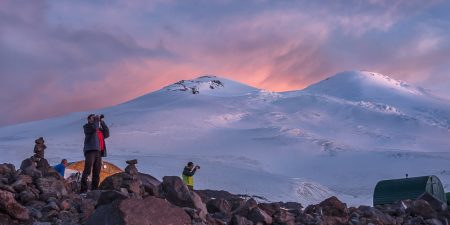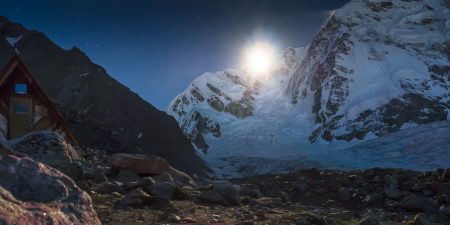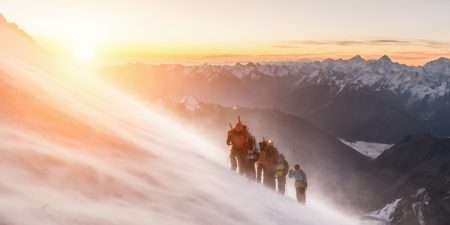€1480
excl. of flights
ON HOLD.
Russia, North Caucasus
Strenuous
3-9 participants
-5 to -20 °C on the summit, strong winds
Discounts for couples and groups
The highest peak of Europe — the two-headed ice giant of Mount Elbrus, Russia — is a spot-on choice of your first high mountain. We offer to climb Elbrus by fair means from the much less developed North side via the route of the first ascenders.
We will gently acclimatise while trekking in Bezengi — one of the most spectacular areas of the North Caucasus, which is often referred to as the ‘Little Himalaya of Europe’ for enormous north faces over two vertical kilometers tall and six technical summits over 5,000m!
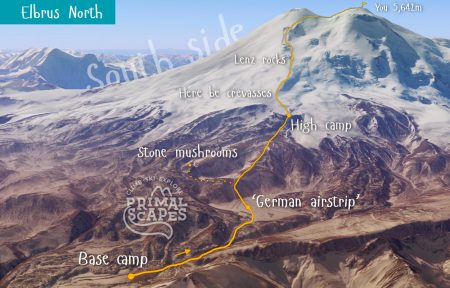
Am I fit enough to climb Mount Elbrus?
You likely have enough fitness for Elbrus if you can casually run a 10k. The trekking portion of the itinerary is moderately demanding as we will be walking on rough terrain such as glacial moraine often sometimes without a trail. Of course, training before the trip is highly recommended.
No previous high-altitude experience is required, thanks to a generously long pre-acclimatization. The climb itself is non-technical but we may need to negotiate a few crevasses so a brief course on glacier travel is included.
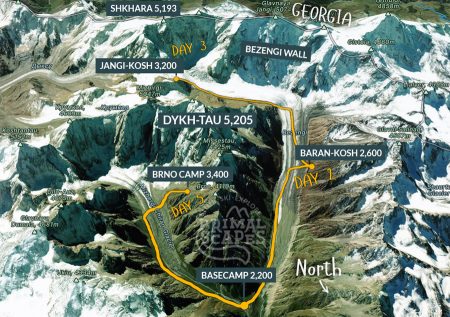
Trekking in Bezengi
Located some 60 kilometers east of Elbrus, the magnificent area of Bezengi is the highest sub-range of the Caucasus mountain chain. If the Chamonix is «the Alps on steroids» then Bezengi must be some crossbreed with the Himalayas. The scale of these mountains is such that often it is hard to appreciate unless you get to a vantage point right at the heart of the range. That’s exactly why we offer trekking in Bezengi as the acclimatization before climbing Elbrus — to guarantee you incredible mountain views regardless of weather conditions we may face on Elbrus.
Bezengi basecamp has a rich legacy — the place where friendly locals greeted and helped elite Soviet climbers since 1959. Two traditional Balkarian towers have been preserved along with a handful of renovated traditional dwellings with a fireplace and a turf roof offered to guests as a high-end accommodation. In the late 19th century the area was frequented by European first ascenders of the golden age of alpinism: Douglas Freshfield, Albert Mummery, John Cockin, and Vittorio Sella. Bezengi also boasts the best infrastructure of all the Caucasus climbing basecamps — accommodation to suit any budget, hot showers, steam saunas, wi-fi, a grocery, a gear shop, a kindergarten, an ethnographic museum, and a couple of bars.
Early AM arrival at MRV airport, private transfer to Bezengi (about 3 hours), check in, dinner and rest.
There is a hot shower, wi-fi and cafes at the basecamp so our stay will be quite comfortable regardless of the weather.
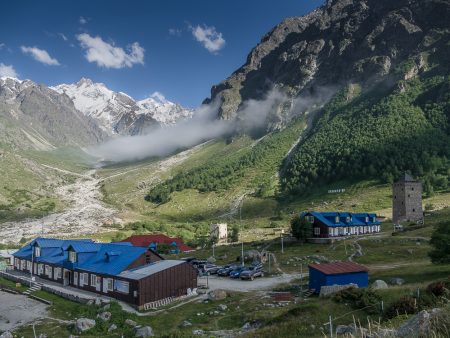
Descend to Bezengi basecamp, lunch and private transfer to Pyatigorsk town that takes about 4 hours. There we check in to a hotel, sort out gear rentals and dine out.
We set out early in the morning, having left any unnecessary stuff at the hotel. In about 3 hours of driving that includes some impressive off-road sections, a 4WD takes us to Elbrus North basecamp located at a vast green meadow at the foothills of the white giant of Elbrus, at 2,500m a.s.l.
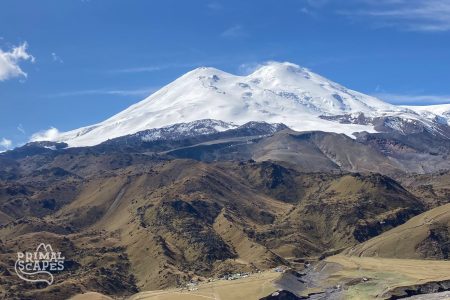
We climb to Elbrus North High camp following a trail via the wind-eroded ‘stone mushrooms’, gaining over one vertical kilometer, and finish the day with a hearty cooked dinner. Porters can carry some of your gear for reasonable prices.
From the Elbrus North High Camp at 3,760m, which is effectively a handful of basic cabins scattered around the ancient lava flow, the mountain looks nearly at hand’s reach — but soon we will realise that it is just an illusion 🙂
After breakfast we set out on the glacier and reach an elevation of around 4,200-4,400m depending on the weather conditions. On the way we will practice crampon work, self-arrest with an ice axe and roping up.
A few crevasses we may well encounter in this section of the climb will make the ropes seem worthwhile!
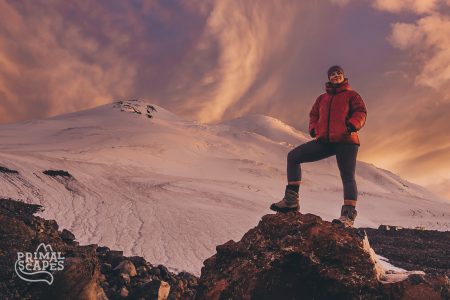
To gain more acclimatization, we climb up to the middle section of the Lenz rocks, most likely to the helicopter crash site, reaching around 4,900m.
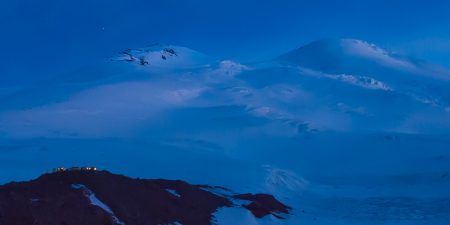
Full rest day. We go to bed at around 7PM and set off for the summit at around 11PM-1AM depending on the weather conditions and the group’s fitness.
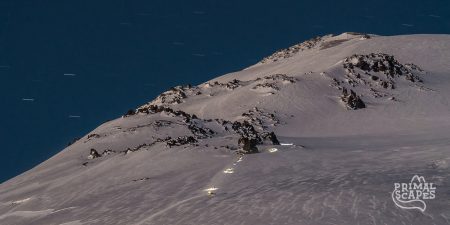
Climb Mt Elbrus main summit and descend back to the high camp. The ascent takes approximately 9-12 hours. The latest turnaround time is usually 1PM but depends on the group’s fitness and weather conditions.
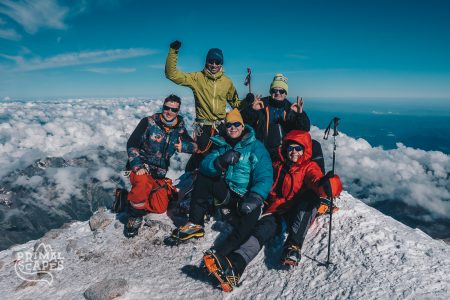
Descend back to the lower base camp at Emmanuel meadow. Alternatively, in case of inclement weather on Day 11, we may choose to make our summit attempt on Day 12.
Private transfer to Pyatigorsk. Guided walk around this historical spa town. Sleep at a hotel.
Founded in 1780, Pyatigorsk is one of the oldest spa resorts in Russia, with beautiful parks, thermal pools, Art Nouveau buildings and vibrant nightlife.
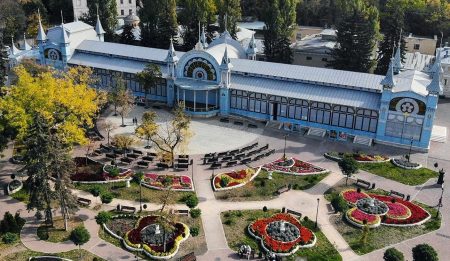
Private transfer to MRV airport. Flight back home.
Mount Elbrus guides
Andrew Golovachev, an IFMGA aspirant ski guide within the guides’ association of Kyrgyzstan, an avid alpine climber, and devoted adventure photographer.
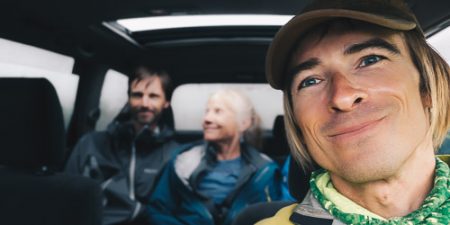
Ran treks, climbs, ski tours and expeditions to Tajikistan Pamirs, Patagonia, Peru, Morocco, Nepal, Kyrgyzstan, Kazakhstan, Siberia, Caucasus and Kamchatka. A full member of the British Alpine Club. Professional avalanche education: equivalent of Canadian Avalanche Association Level 1 certificate.
Visited over 40 countries, lived in the UK for four years. Certified first-aider.
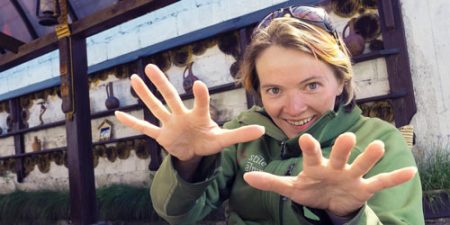
Anna Drozhzhina, an experienced trek leader and an aspiring mountain/ski guide, a student of Kyrgyzstan Mountain Guides Association (KMGA/IFMGA), now based in Budapest, Hungary. Considerable experience working as a lead guide on Elbrus (over 30 climbs from South, North and West), Kazbek and Kamchatka. Certified first-aider. Speaks English and French.
Booking terms
Sounds exciting? It truly is! We love the place and would be happy to share it with you. Should you have any questions, please check out our FAQ section below. Alternatively, don’t hesitate to send us your inquiry using the contact form or WhatsApp.
We require financial commitment from participants in the form of two deposits made via bank transfer or Paypal. The first deposit of €140 is made immediately to secure your place. Part of this amount goes towards furnishing the Russian visa invitation and other administration costs. The second deposit of €360 must be made no later than three months before the trip so we could pre-book the logistics with the local operators. To save on bank fees you might prefer a single deposit of €500 instead. The remaining balance is paid in cash upon arrival.
Cancellation policy
If you need to cancel your trip 60 days or less before departure because you are prevented from travelling due to:
1) a government banning non-essential travel to the destination or imposing a quarantine for vaccinated upon arrival upon return from the destination country, or
2) a national or local lockdown
We will put your deposits in full towards a future trip with us, this year or the next year.
The above does not apply in the following cases:
– You or a family member is diagnosed with Covid and you are required to self-isolate, which prevents you from travelling.
– A close relative is diagnosed with Covid and you are required to care for them.
– You are denied boarding to your flight due to failing Covid checks.
– You are unable to join your trip due to not fully complying with the testing or vaccination requirements to enter the destination country.
We strongly recommend taking out a travel insurance with specific Covid-19 cancellation and curtailment provision which is now available from many reputable providers.
We also promise a 14-day risk-free booking window: you can cancel at any point within two weeks after you put down the first deposit. This buys you time to sort out vacation and flights, to bring in your friends, etc. and not have to worry about someone else taking your spot on the trip.
In case of cancellation of the trip by the participant due to any other personal circumstances any deposits made are NOT refunded. At our sole discretion we may put them towards your future trips with us.
The minimum group size for this trip is 3 participants plus the guide. Should there be less, there may be a surcharge; alternatively the trip may be cancelled and all deposits made will be returned in full. In case of any unforeseen circumstances that prevent us from running the trip, such as a serious illness of the guide, we will attempt to make alternative arrangements which may involve change of the itinerary and/or the organizer. Should that attempt fail or in case you are not happy with the changes any deposits made will be refunded in full.
Start Your Journey
Got a question or ready to plan your adventure? Drop us a line using the form below — we’ll reply within 24 hours!
Prefer email? Reach out at hello@primalscapes.com
We promise no spam — just answers. Your info stays safe with us and won’t be shared.



